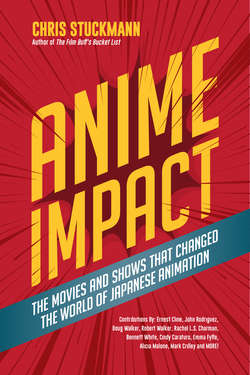Читать книгу Anime Impact - Chris Stuckmann - Страница 14
На сайте Литреса книга снята с продажи.
Оглавление1983 • Barefoot Gen
Hadashi no Gen
— Chris Stuckmann —
Note: This article discusses the gruesome depiction of the bombing of Hiroshima as seen in Barefoot Gen.
Barefoot Gen was a title I’d heard of for something like fifteen years. Whispers in the corner of the comics store, fleeting mentions on those early message boards, and before long, I received a copy of it in my PO Box from a generous viewer (thank you!). Clearly, the film had made an impression. Sitting down to watch it, I had a snack and a drink, and had no idea what I was getting into. It didn’t take long for the nausea to settle in. To say that Barefoot Gen floored me would be a legitimate understatement. This film scarred me. I’ve seen a lot of disturbing things in movies, but nothing quite like this. This is partially because I decided to watch the film blind, having no preconceived knowledge of the plot.
We follow young Gen, an optimistic boy living in Hiroshima, Japan in 1945. He lives in a small house with his brother, sister, and parents. Money isn’t just tight, it’s virtually nonexistent. The ongoing war has taken food and workers from the city, and left those remaining families on the cusp of starvation. Gen’s mother is pregnant and very weak, as she requires energy for not just herself, but the child she’s carrying. Gen and his brother often spend their days scavenging around the neighborhood for food, working with their father in the fields, and roughhousing like all kids do. Being awoken in the middle of the night by sirens is so common that Gen and his brother feel comfortable making jokes about it. “It’s probably just another spy plane,” Gen often says, dismissing the warnings.
From what we see in the first half of Barefoot Gen, it’s clear that Gen and his brother are relentless in their pursuit to help their family. In one touching scene, a neighbor suggests that carp is the best kind of fish for their mother’s health. As a result of this advice, the boys sneak into a wealthy man’s garden and swipe a carp from his small pool. When they’re caught by the man, they stand up to him, saying that he can hit them as many times as he wants, if they can just keep the fish for their mother. It’s early scenes like this that make Gen’s unrelenting spirit and idealistic confidence work later on. His passion for protecting his family is apparent, and it’s one of the most beautiful aspects of the film.
Before long, the day comes. August 6, 1945.
I had become so attached to this loving family and their struggle for survival that I was dreading the inevitable. I’ve seen many films about nuclear war. The horror of it, the pain, the loss. But truthfully, I’ve never seen it depicted this explicitly. In one devastating sequence, Barefoot Gen goes from what appears to be a G-rated family film, to a hard R, possibly even NC-17. Before the violence though, it’s the serenity, the silence of Hiroshima that’s captured so heartbreakingly. Everyone in the town is going about their business. Children are in school, men and women are working in the fields. And then, one lone plane flies over the town and unleashes hellfire in the form of a single bomb and obliterates everything they ever knew. A young girl lets out a shrill cry, her balloon she’s holding explodes, and we watch in sheer horror as her eyeballs melt in her sockets, her body slowly turning to ash. A dog writhes in pain as it implodes, a mother kneels to shield her baby from the blast, their bodies fusing together like a grotesque wax sculpture. Gen had bent over to pick something up, partially obscuring his body from the blast. He stands up, and looks for his friend he was just talking to, a young girl who now lies in a crumpled pile, her body shredded and burned. In one instant, Gen’s entire life is altered for the worst. Suddenly, all that matters is his family. There is nothing else anymore.
The remainder of the film doesn’t shy away from the after-effects of the bomb’s devastation. People emerge from the smoke, stumbling forth like zombies, their skin melted and scarred. Women suffering from malnutrition no longer have breastmilk for their young. There’s no attempt to censor the disturbing nature of this tragedy. Men, women, children, and yes, even infants were wiped out instantly. But the filmmakers knew that wasn’t the extent of what the bomb did to Hiroshima. The aftermath of the explosion caused years of sickness and death, and this is all detailed with terrifying scrutiny. I’ve seen Isao Takahata’s disturbing and powerful Grave of the Fireflies—another anime about the pain of war, and perhaps a better film—but I simply wasn’t prepared for this movie. I had to pause the Blu-ray a few times to take a breath. “Holy shit,” I declared aloud to no one. It’s not an easy watch, in fact, I’m sure many will skip this recommendation in favor of something more uplifting. I wouldn’t blame you.
As of this writing, we live in a climate that hasn’t been this aware of nuclear threat since the days of the Cold War. Our conversation about it is sometimes mistakenly humorous. I’m reminded of Gen’s initial dismissal upon hearing the air raid sirens. “It’s probably just another spy plane.” I encourage everyone reading this to watch this film. It’s been released on Blu-ray for the first time, and it’s more readily available than ever. Mori Masaki’s film pulls no punches with its anti-war message, and that message has never been more timely.
